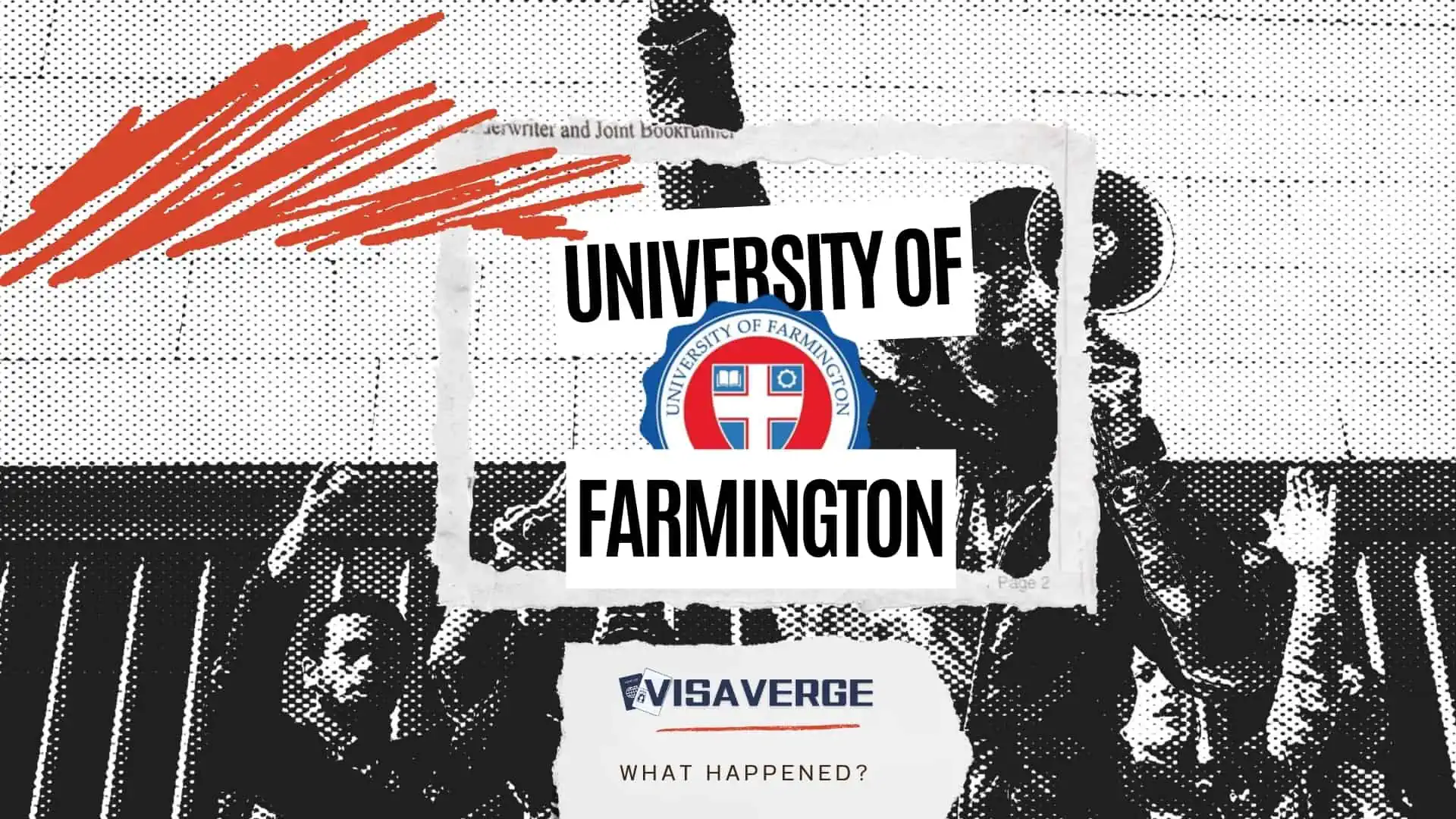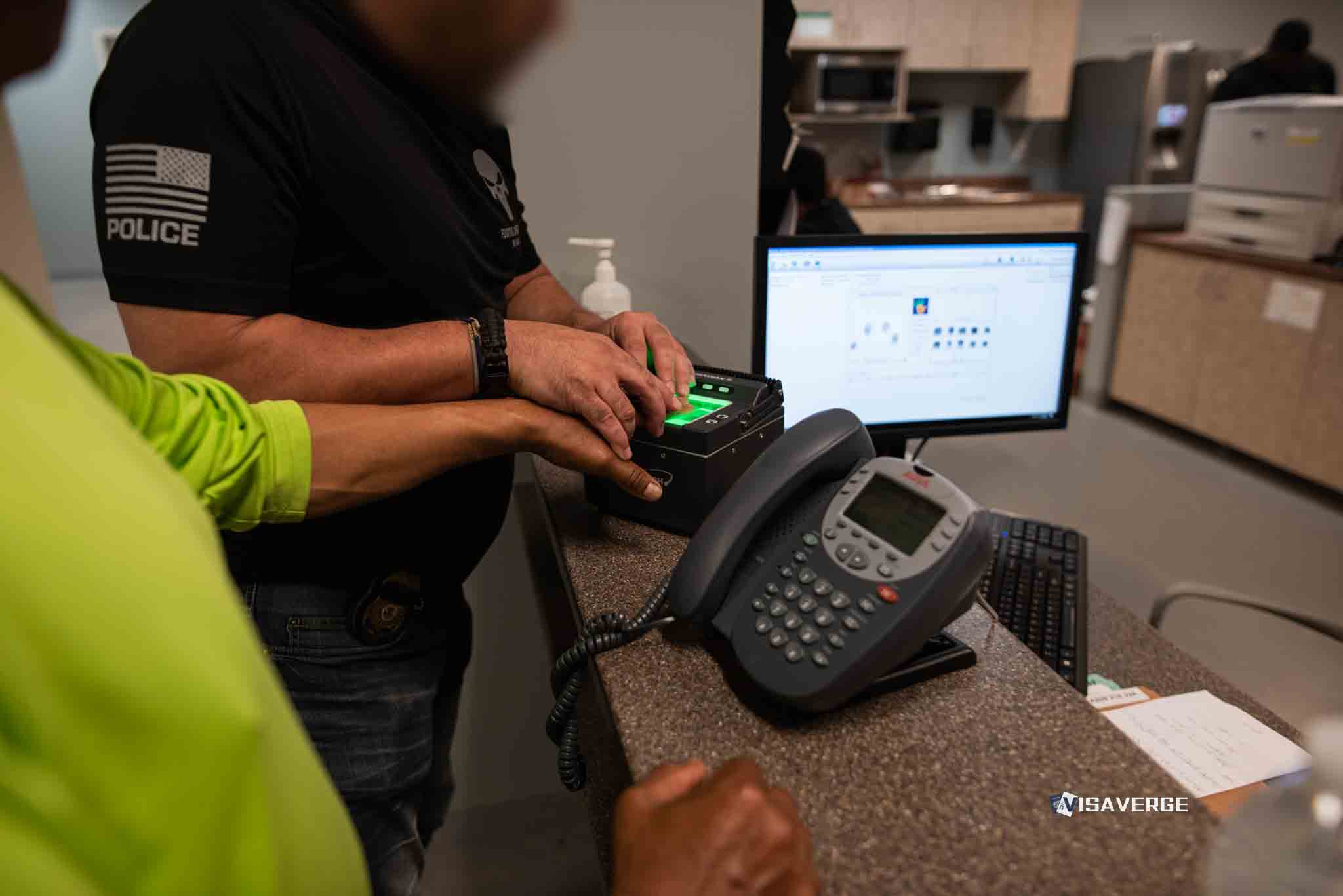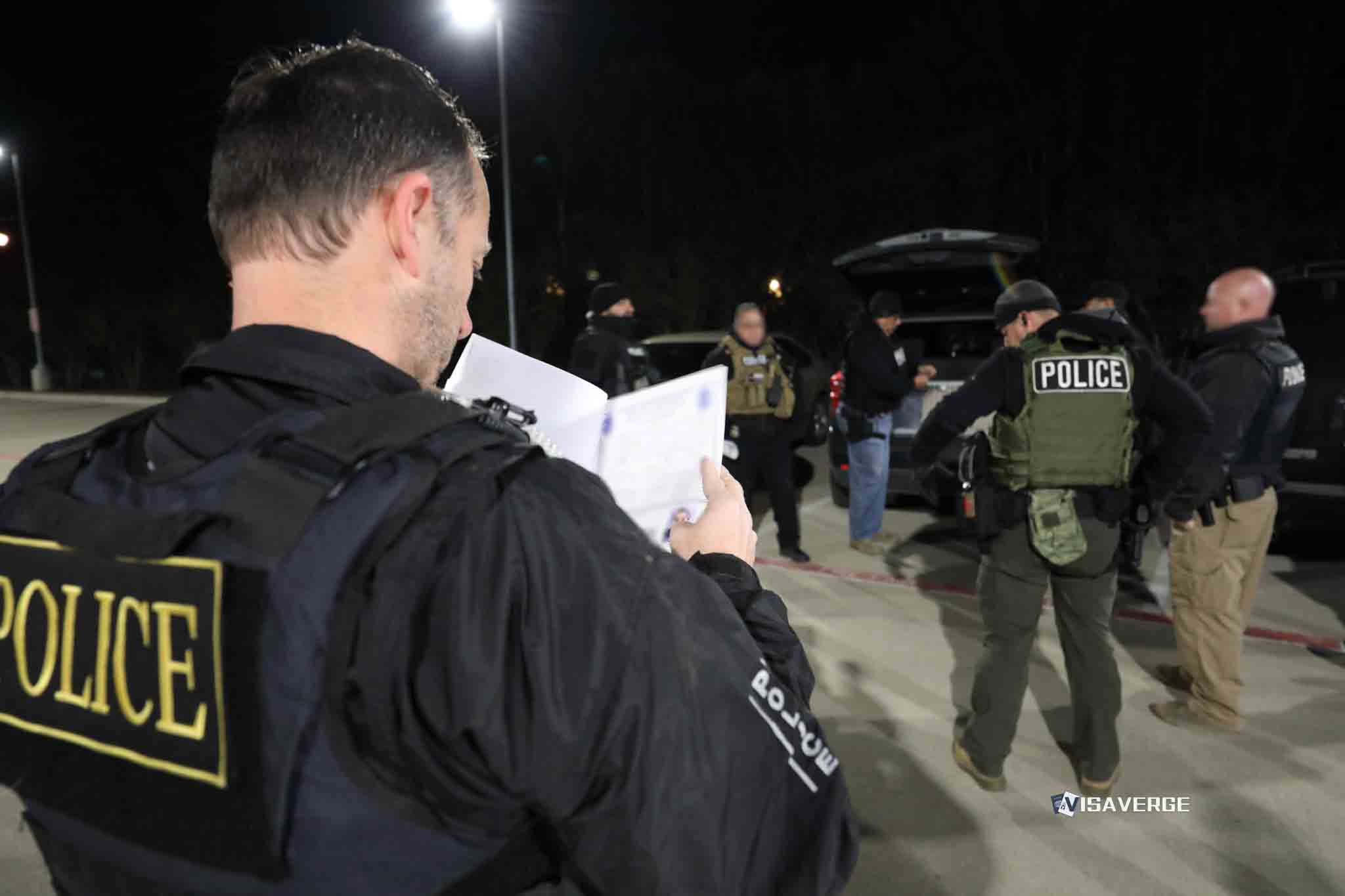The University of Farmington case is still one of the biggest immigration stories in the United States 🇺🇸. Many people are talking about what happened, how it affected hundreds of international students, and how it might change the rules for student visas in the future. Here is a detailed look at what happened, why it matters, and what it means for students, schools, and immigration laws today.

How the University of Farmington Sting Began
Back in 2015, Immigration and Customs Enforcement (ICE) started a special secret project in Michigan. This project was called Operation Paper Chase. ICE set up the University of Farmington as a fake school in Farmington Hills, Michigan. The university had no teachers or real classes. The main goal was to find foreigners who were using student visas just to stay in the United States 🇺🇸, not to study.
On paper and online, the University of Farmington looked real. It was even listed on official government websites as an approved school for the Student and Exchange Visitor Program (SEVP). Many people thought it was a normal, legal school. This was, in fact, part of the plan: the school was set up to look as real as possible so that students might try to enroll.
Hundreds of foreign nationals, mostly from India 🇮🇳, signed up. Most wanted to keep their legal F-1 student visas, especially after losing spots at other schools that had lost their official approval. What they didn’t know was that ICE was running the school as a sting—a trap to catch visa fraud.
What Happened Next: Key Moments in the Story
To understand why this story is so important, it helps to look at a simple timeline:
- 2015: ICE opens the fake University of Farmington for Operation Paper Chase.
- 2016–2018: More students join, often after their first school loses U.S. government approval.
- January 30, 2019: ICE makes the sting public. They arrest eight “recruiters” for helping students join the fake school for money.
- February–March 2019: ICE detains or arrests more than 250 students across the United States 🇺🇸. The news spreads worldwide. India 🇮🇳 speaks out against how the United States 🇺🇸 handled things.
- Late 2019–2020: Many legal battles begin. Some students file lawsuits against the government saying they were trapped unfairly.
- July 2024: A federal appeals court allows Farmington students to sue the U.S. government for the first time, saying they paid for classes that never existed.
This simple timeline shows how one undercover operation turned into a national—and international—debate about immigration.
The Legal Side: Sentences, Money, and Deportations
After the sting was made public, federal prosecutors charged eight people with crimes. These people were called “recruiters.” They helped students sign up for the fake university so that they could keep their student visas. The recruiters got either cash or a cut of the tuition fees for every student they enrolled.
The government said these recruiters earned more than $250,000. All of them pleaded guilty in court. Their sentences ranged from six months to two years in prison. Because the sentences were over a year, they would be deported and would probably never be able to return to the United States 🇺🇸.
But it was the students who felt the biggest impact. Out of over 600 people who signed up:
- At least 250 were held or arrested in different states.
- About 200 chose to leave the United States voluntarily instead of fighting a long court process.
- About 50 stayed and were eventually deported or arrested.
Most students paid between $10,000 and $15,000 in tuition. None of that money was ever returned, even after they were forced to leave. Many said they felt like criminals and struggled after going back home.
Prudhivi, a former student, said, “We lost our time and money and mental health because of this operation.” Many others described depression and years lost, feeling it was not their fault.
A Fresh Chance: Students Allowed to Sue for Compensation
A big change happened in July 2024. A U.S. federal appeals court decided that Farmington students could sue the government. The students argued that ICE promised admittance and classes in exchange for tuition, but then never delivered these services.
The lawsuit claims that the United States 🇺🇸 government broke a contract with the students. In court records, it said, “Defendant…breached its standardized contracts…by failing to provide them with promised products/services.” The students want their money back and, maybe even more importantly, a clean immigration record so they can apply again for school in the United States 🇺🇸.
Student lawyer Anna Nathanson said, “I absolutely think their visas should be reinstated…that’s what would help them get their lives back on track.”
This lawsuit could open new paths for people caught in similar stings. If the courts side with the students, they could get their money back or perhaps even a second chance at studying in the United States.
Different Points of View: Was It Fair?
This sting operation created a fight between government officials and immigrant advocates.
What the Government Says:
ICE and the Department of Homeland Security defend the operation. Matthew Schneider, a U.S. Attorney, said, “These foreign ‘students’ weren’t students at all—they were scam artists trying to stay illegally.” He argued that the students should have known there were no real classes or activities, and that this was a clear attempt to bend the rules.
What the Critics Say:
Many immigration lawyers, student rights groups, and politicians have a different opinion. They call the operation “entrapment.” They argue that many students just wanted to stay in school after their old schools closed, and that the United States misled them.
Senator Elizabeth Warren said the operation was “cruel.” She and others said the government broke trust with young people and families who simply wanted to study in the United States 🇺🇸 for a better future.
India’s Ministry of External Affairs strongly criticized American authorities. Many Indian 🇮🇳 families now doubt if it is safe to send their children to study in the United States 🇺🇸 after what happened.
Has the Law Changed? What’s Different Now?
So far, no major laws or rules have been changed directly because of the University of Farmington sting. The Department of Homeland Security has not announced any big changes since early 2023. However, as reported by VisaVerge.com, the Farmington case is still playing a role in pushing for new ideas about fairness and information sharing between students and the government.
Advocacy groups still want Congress to pass new rules. Some of their suggestions are:
- Make sure students get clear warnings if their school loses approval.
- Give students more time and help if they need to find a new school.
- Stop the use of sting operations that can trap innocent students.
Schools and government officials now pay closer attention to how they share information with students. But no policy has been officially changed to prevent fake universities or to better protect students stuck in the middle if something goes wrong.
Advice for Students Wanting to Study in the United States (as of April 2025)
If you’re thinking about studying in the United States today, here are some simple steps to keep you safe:
- Always check that a school is certified by SEVP. Do not just trust the school’s own website. Check the official SEVP-certified school list for the latest information.
- If your school loses approval or accreditation, get in touch with your home country’s embassy and talk to a qualified immigration attorney before enrolling at a new school. Do not trust emails or offers from unknown addresses.
- If you lost money or got in trouble with visa status due to a school like the University of Farmington, know that you may now join group lawsuits seeking refunds and help with your status.
Remember, scams can look very official. Official government websites are always the best place to double-check information before making decisions about your education.
What Does This All Mean? Looking at the Bigger Picture
Here’s why the University of Farmington story really matters, not just for those directly involved, but for everyone thinking about moving to the United States 🇺🇸 on student visas:
- It shows how complex U.S. immigration law can be, and how quickly things can change.
- Students and families have to be extra careful, checking every detail of their school’s status before applying or paying any money.
- The story has affected trust, with Indian 🇮🇳 families and others reconsidering if the United States 🇺🇸 is the right place for education.
- The courts are now allowing students to defend themselves in ways that were not possible just a few years ago, including asking for their money back and maybe getting another chance to study.
- The debate continues about what is fair: catching real abusers of the system, or protecting students from getting trapped when things go wrong through no fault of their own.
As these cases move forward, the rules for student visas and the way Immigration and Customs Enforcement runs investigations may still change.
Summary of Major Events
Here is a quick list of what happened and what it means:
- January 2019: The University of Farmington sting becomes public. Many people are arrested.
- Early 2020s: Former students go to court to get justice for lost money and ruined study plans.
- July 2024: Courts let Farmington students sue the U.S. government, possibly winning back money and fixing their records if they succeed.
- Policy debates continue: No law has yet changed, but advocacy groups and lawmakers are asking for clearer rules and better protections.
Final Thoughts: What Comes Next?
The University of Farmington story is far from over. With courts now allowing lawsuits over the sting, many former students are waiting for answers. Will they get their money back? Could they even be allowed to try again in the United States 🇺🇸? The answers will shape not only their lives but also the rules for all international students in the future.
As policymakers review student visa policies, groups helping immigrants hope that new rules will be more open, honest, and fair, making it easier for those truly seeking an education to do so safely.
For now, anyone interested in studying in the United States 🇺🇸 should stick to official information, double-check every offer, and get advice from trusted legal experts. The case of the University of Farmington and Immigration and Customs Enforcement shows the risks, but it also points toward a future where students can expect better support and protection.
Stay tuned, as what happens next with lawsuits, laws, and student visas could change the story of international education for years to come.
Learn Today
Operation Paper Chase → A secret ICE operation creating a fake university to catch student visa fraud in Michigan, starting in 2015.
Student and Exchange Visitor Program (SEVP) → A U.S. government program overseeing schools that enroll international students on F-1 and M-1 visas.
F-1 Student Visa → A non-immigrant visa for foreign nationals to study full-time at accredited academic institutions in the United States.
Entrapment → A law enforcement tactic where officials induce someone to commit a crime they otherwise might not have committed.
Accreditation → An official recognition that a school meets certain standards, allowing it to enroll international students legally.
This Article in a Nutshell
The University of Farmington sting by ICE revealed complexities in U.S. student visa systems, affecting over 600 primarily Indian students. In July 2024, courts allowed them to sue for tuition refunds. The case continues to spark debate on law, fairness, and protections for prospective international students in America.
— By VisaVerge.com





